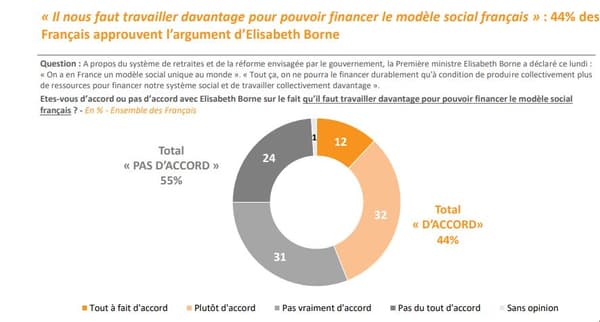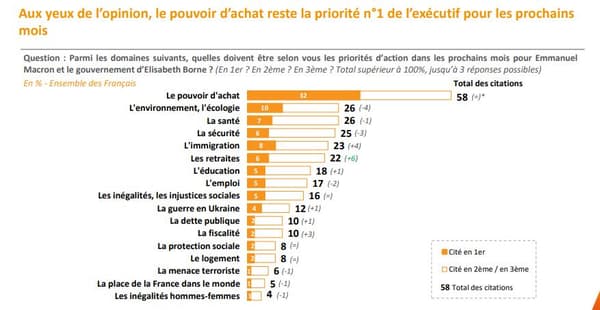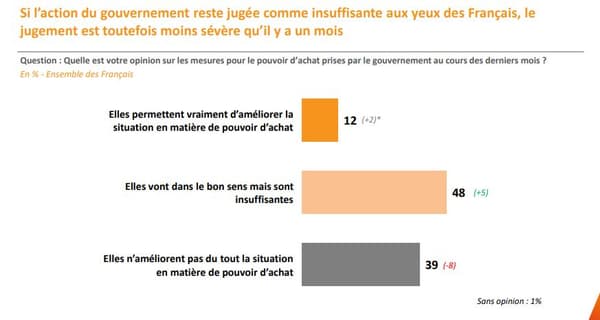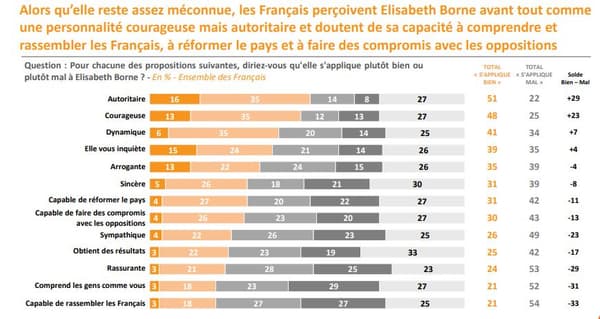While the Executive prepares the return of the pension reform, the French and their Government are not in unison on this issue. In fact, our new survey “L’Opinion en direct” conducted by the Elabe Institute for BFMTV, which we broadcast this Wednesday, shows that the majority of French people do not believe that we should work harder to finance our social model. This was the argument put forward on Monday on our set by the Prime Minister, Élisabeth Borne.
Furthermore, while the issue of purchasing power is more than ever the priority set by those surveyed at the Elysée and Matignon, a relative majority continues to deplore a policy that is, of course, going “in the right direction” but remains “insufficient “. Last essential element of our investigation: the electorate seems to be very divided in its perception of Elisabeth Borne and her action, the Prime Minister even seems to be an unknown.
64% of workers do not consider it necessary to work more
On Monday, guest of our journalist Apolline de Malherbe, Elisabeth Borne tried to clarify the delicate issue of the reform of the pension system. “It is important to say that in France we have a unique social model in the world. Health, school… We can only finance it sustainably if we produce more resources, work more collectively”, she judges.
A long development summed up like this by Elabe with his panel: “We need to work more to be able to finance the French social model”. The latter was then invited to react. And the reaction is not positive. 55% of the French reject this argument of the head of government. They are even 64% among the active, and 71% among the workers. 62% of retirees, on the other hand, continue to support Élisabeth Borne.
On the political side we find the expected contrasts. 72% of Jean-Luc Mélenchon’s voters in the last presidential election say they oppose it, as do 67% of Marine Le Pen’s, while 78% of Emmanuel Macron’s supporters support Matignon’s statements .

Purchasing power, priority of priorities
In terms of resources, it is above all purchasing power that worries the French. They are thus 58% (stable percentage with respect to the previous measurement of August 24) to designate it as a government priority for the coming months, among 17 other proposed topics. This concern is ahead of that related to ecology (26%), health (26%) and safety (25%).
We also note the prevalence of the importance of the question of purchasing power in all socio-professional categories, all age groups and in all electorates. However, it is more marked within the working classes – up to 66% of respondents – 35-64 years – 65%. Marine Le Pen voters are the most determined electoral segment in this regard, with a percentage of 67%.

Government action ‘not enough’
However, as for the action implemented by the Executive to defend this purchasing power, the French are not satisfied. It is true that they are 5% more than a month ago to declare that this is going “in the right direction” for a total of benevolence that amounts to 48%… but they conclude that these well-directed measures are still “insufficient”. 39% of respondents, after an eight point drop, even deplore devices that do not “improve the situation at all”.
In detail, 49% of the French who are “restricted” economically at the end of the month consider the Government’s action to be positive but “insufficient”, after a jump of 13 points. As for the most precarious, they decide more clearly, deploring “ineffective” measures for 61% of them. 52% of the followers of Jean-Luc Mélenchon and Marine Le Pen think the same about these measures.

The French reserve their opinion on Elisabeth Borne
On the other hand, it is very difficult to read the opinion of the French about the Prime Minister, who is in charge of supervising this policy. They are 37% to find him “bad” in this function, 31% to consider him “good” in the role, while 32% of those surveyed cannot decide.
Because this is the heart of the problem that Elisabeth Borne faces in public opinion: she is little or nothing known there more than a quarter after her arrival in Matignon. Even 27% of the supporters of the President of the Republic, who nevertheless appointed her there, acknowledge that they do not know her well enough to express an opinion. In the opposition, there are fewer doubts. 57% of rebel sympathizers rate it “bad”, as do 52% of Marine Le Pen’s circle.

Paradoxically, this lack of notoriety could, however, soften Elisabeth Borne’s pain when reading the study. Choosing among 13 traits to profile the head of government, the qualifiers most frequently chosen present her as “not very reassuring” – according to 53% of our fellow citizens – “authoritarian” – according to 51% of our compatriots – and even ” unfriendly (49%) Small consolation: an almost equal number (48%) salute “her bravery” A consolation and a snag, because a quarter of the French refused to lend themselves to her portrait, preferring not to comment Elisabeth Borne you definitely need to work harder to make yourself known.
Sample of 1,001 people representative of residents of mainland France aged 18 and over. The representativeness of the sample was ensured according to the quota method applied to the following variables: sex, age and profession of the interviewee after stratification by region and agglomeration category. Internet interview from September 27 to 28, 2022.
Source: BFM TV

